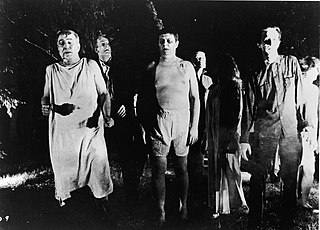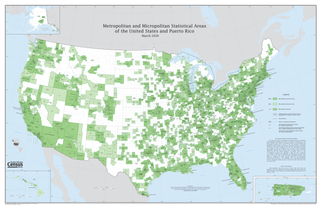
The politics of Iran takes place in the framework of an Islamic theocracy which was formed following the overthrow of Iran's millennia-long monarchy by the 1979 Revolution.

The United States Department of Education is a cabinet-level department of the United States government. It began operating on May 4, 1980, having been created after the Department of Health, Education, and Welfare was split into the Department of Education and the Department of Health and Human Services by the Department of Education Organization Act, which President Jimmy Carter signed into law on October 17, 1979.

Manoj Nelliyattu "M. Night" Shyamalan is an American filmmaker. His films often employ supernatural plots and twist endings. The cumulative gross of his films exceeds $3.3 billion globally. Shyamalan has received various accolades, including nominations for two Academy Awards, two BAFTA Awards and a Golden Globe.
In the United States, a metropolitan statistical area (MSA) is a geographical region with a relatively high population density at its core and close economic ties throughout the region. Such regions are not legally incorporated as a city or town would be and are not legal administrative divisions like counties or separate entities such as states. As a result, sometimes the precise definition of a given metropolitan area will vary between sources. The statistical criteria for a standard metropolitan area were defined in 1949 and redefined as a metropolitan statistical area in 1983.

A B movie, or B film, is a type of cheap badly made commercial motion picture. Originally, during the Golden Age of Hollywood, this term specifically referred to films meant to be shown as the lesser-known second half of a double feature, somewhat similar to B-sides in recorded music. However, the production of such films as "second features" in the United States largely declined by the end of the 1950s. This shift was due to the rise of commercial television, which prompted film studio B movie production departments to transition into television film production divisions. These divisions continued to create content similar to B movies, albeit in the form of low-budget films and series.

Proposition 57 was a California ballot proposition on the March 2, 2004 primary election ballot. It was passed with 4,056,313 (63.4%) votes in favor and 2,348,910 (36.6%) against. The proposition authorized the state to sell $15 billion in long-term bonds to pay off accumulated deficits. Proposition 57 went into effect only because Proposition 58 also passed.

Proposition 58 was a California ballot proposition on the March 2, 2004 ballot. It passed with 4,535,084 (71.2%) votes in favor and 1,841,138 (28.8%) against. It was officially called the California Balanced Budget Act. It requires the state legislature to pass a balanced budget every year, which means that budgeted recurrent expenditure, including repayment of past debt, does not exceed estimated revenue. The act does not require that capital works programs be funded out of current revenues. The California Constitution has always allowed bond issues for specified capital works, above a certain value. Bond measures must be approved by a statewide ballot.

The United States Intelligence Community (IC) is a group of separate U.S. federal government intelligence agencies and subordinate organizations that work both separately and collectively to conduct intelligence activities which support the foreign policy and national security interests of the United States. Member organizations of the IC include intelligence agencies, military intelligence, and civilian intelligence and analysis offices within federal executive departments.

Leon Edward Panetta is an American retired politician and government official who has served under several Democratic administrations as secretary of defense (2011–2013), director of the CIA (2009–2011), White House chief of staff (1994–1997), director of the Office of Management and Budget (1993–1994), as well as a U.S. representative from California (1977–1993).

United States micropolitan statistical areas, as defined by the Office of Management and Budget (OMB), are labor market and statistical areas in the United States centered on an urban cluster with a population of at least 10,000 but fewer than 50,000 people. The micropolitan area designation was created in 2003. Like the better-known metropolitan statistical areas, a micropolitan area is a geographic entity used for statistical purposes based on counties and county equivalents. On July 21, 2023, the Office of Management and Budget released revised delineations of the various CBSAs in the United States, which recognized 542 micropolitan areas in the United States, four of which are in Puerto Rico.

A low-budget film or low-budget movie is a motion picture shot with little to no funding from a major film studio or private investor.
A no-budget film is a film made with very little or no money. Actors and technicians are often employed in these films without remuneration. A no-budget film is typically made at the beginning of a filmmaker's career, with the intention of either exploring creative ideas, testing their filmmaking abilities, or for use as a professional "calling card" when seeking creative employment. No-budget films are commonly submitted to film festivals, the intention being to raise widespread interest in the film.

Colorado law required school districts to set aside money from within the total budget for specific purposes, such as buildings, insurance, books and other school supplies, and services for "at-risk" students. These specific budgetary earmarks accounted $600 on average per student according to 2004–2005 school year figures — roughly eight percent of district operating budgets. Referendum J proposed a new requirement: each school district must spend a minimum of 65% of its operating budget on a set of budget items specified in the referendum.

Franchise Pictures, LLC was an American independent motion picture production and distribution company, founded in 1997 by Elie Samaha, Ashok Amritraj, and Andrew Stevens. They were known for their production in the action film genre. The company also had a short-lived video game arm, Franchise Interactive.
The Pittsburgh Intergovernmental Cooperation Authority, is a special administrative body that was created by the Commonwealth of Pennsylvania to oversee the finances of the City of Pittsburgh.
Ibis Budget is a French budget hotel brand owned by Accor. Created in 1992 in France under the name Etap Hôtel, the brand was renamed Ibis Budget in 2011. As of 2018, Ibis Budget managed 614 hotels in 20 countries.
Jan Sadharan Express trains are series of passenger services operated by Indian Railways in different routes. These trains are the first generation of fully unreserved express train sets. The second generation is the Antyodya Express.

Thomas Jurk is a German politician of the Social Democratic Party (SPD) who served as a member of the Bundestag from the state of Saxony from 2013 until 2021.











